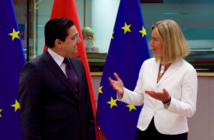Despite the economic crisis, European support for reforms underway in Morocco is undiminished.
By Hassan Benmehdi for Magharebia in Marrakech
[Hassan Benmehdi] EU and Moroccan officials on December 16th held a Rabat press conference to discuss new social programmes.
Morocco, which lags behind in these areas, is receiving financial contributions and the know-how of the European community to help find adequate solutions.The European Union Delegation in Rabat on December 16th wrapped up a field visit to Settat and Marrakech. The purpose of the regional trip was to see whether EU-funded literacy, hospital care and education programmes were working.
EU ambassador to Morocco Eneko Landaburu told Magharebia that the co-operation between Morocco and the EU was going well and that Morocco was the first Arab state to receive European financial aid by virtue of its neighbouring position and “advanced status”.
“At present, it is difficult to answer the question of whether the financial aid granted to Morocco by the EU will be affected by the economic crisis,” he said.
“A heated debate is being had in Europe at the moment because aid budgets for the next few years are currently being decided on, but I’m very optimistic and we will be on the same budgetary volumes allocated to Morocco,” Landaburu added.
In a similar statement, Moroccan Health Minister Houcine El Ouardi sought to illustrate the importance of the technical support given by the EU.
“In addition to financial aid, we also need innovative thinking and know-how in the area of management,” El Ouardi said. He further says that this aspect is essential to efforts to improve the quality of services and efficiency of hospitals in Morocco.
Another purpose of the visit was to find out what has been achieved by the EU programmes aimed at supporting the target populations.
The beneficiaries confirmed that these support programmes, focused mainly on disadvantaged communities, have had a positive impact.
A total of 86 million euros were allocated for health programmes between 2009-2013, with 44 million euros going specifically to healthcare for the 2008-2012 period.
The financial aid granted by the EU to tackle illiteracy amounted to 27 million euros over five years. This programme helped more than 735,000 people from 2011-2012.
During a visit to one literacy centre, the centre’s chief, Ait El Mekki, said that 5,000 people benefited from its services. Illiteracy in the region was at 52% in 2004, but was reduced to 38% in 2012,aufaitmaroc.com reported.
“I’ve learned a lot, and the support of the trainers has enabled me to start up a livestock-rearing project,” said one woman who took part in the education and learning scheme.




![[Hassan Benmehdi] EU and Moroccan officials on December 16th held a Rabat press conference to discuss new social programmes.](http://magharebia.com/cocoon/awi/images/2012/12/17/121217Feature3Photo1.jpg)


